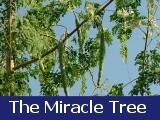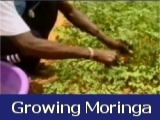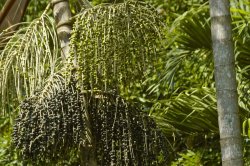
|
Contact usSuper Fruits!
Food For Life
UCT Children's Agricultural CurriculumUCT ProjectsCaribbean Disaster Relief
|
home >> the
miracle tree>>food for
life >>super
fruits>> acai fruit Food for Life - Caribbean - Acai fruit
In Brazil, a highly nutritious, thick, pulpy, deep purple juice is produced from the fruits and commonly offered everywhere in the country. It is best consumed plain, fresh and unpasteurized but can also be used in juice blends. Particularly noteworthy in the long list of beneficial contents in the juice is its high percentage of dietary fibers, which makes up a third of its weight. Because of the Açaí fruit’s potentially elite antioxidant capacity, studies are being done to test the berry’s anti-cancer potential. In one of the first studies, undertaken at the University of Florida in 2006, researchers discovered that Açaí berry extracts caused up to 86% of the tested Leukemia cells to self-destruct. These findings were published in the Journal of Agricultural and Food Chemistry. Other scientific studies continue to be published on the fruit’s nutritional profile and possible health benefits. The Açaí berry is a product of the palm species Euterpe Oleracea (common name: the Açaí Palm), a slender and elegant, clustering palm from northern South America, and its cultivar E. Oleracea “Pará Dwarf”. Both varieties produce the berry, but the Pará Dwarf cultivar has particular benefits that make it the palm of choice for growing the fruit in its native Brazil — benefits which make it clear why this variety is nicknamed “Super Berry.” First, Pará Dwarf starts producing fruits with a trunk height of only 1m (3 ft.), which is equivalent to 3 years of age after planting, in a tropical climate. Second, this variety, as the “Dwarf” implies, stays relatively short for easier harvesting. Third, it is a highly productive plant. A recommended 400 plants per hectare (2.5 acres) yield about 10 metric tons (22000 lb) of fruit per year. Finally, the Pará Dwarf variety produces fruits of the highest quality, with up to 25% more pulp than the regular açaí. It is said to have the following properties: Information sourced www.rarepalmseeds.com • risk of high blood pressure |
|
SOWING SEEDS OF SUCCESS - MORINGA CURRICULUM SUPER FRUIT CURRICULUM NEW LIFE CURRICULUM
|
| Copyright © 2024 www.UnitedCaribbean.com. All rights reserved. Disclaimer Click to Contact us |



















































